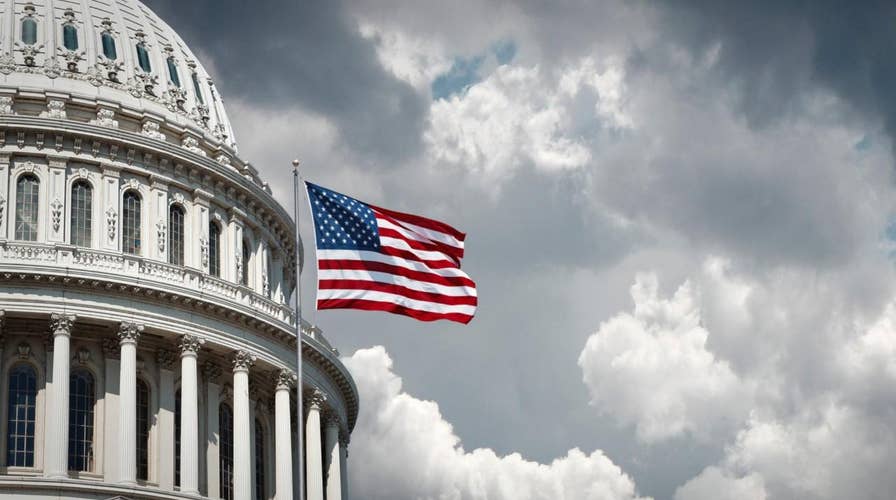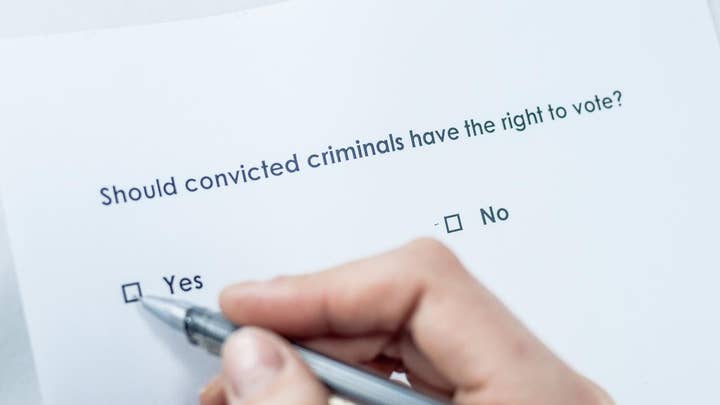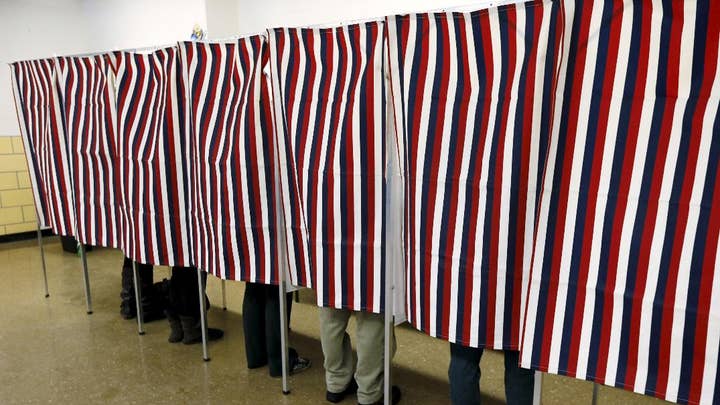Midterm ballot measures: California gas tax, marijuana laws and other top initiatives
In the midterm elections many states carried initiatives on the ballot. From marijuana laws to California’s gas tax increase, here are some of the states that passed new measures and what they mean.
Along with deciding who will control the House and Senate for the next two years, Americans on Tuesday cast their votes on a number of state ballot measures, on issues ranging from marijuana policy to voting rights.
Below, Fox News has compiled a list of the results for a number of key measures sure to shape events and policy in states across the nation.
California: Gas tax increase won't be repealed
Among numerous measures that went before the state's voters Tuesday, Californians rejected a proposal to repeal a gasoline tax increase that was passed by the Legislature to fund road and transportation projects. Proposition 6 failed Tuesday after Democrats campaigned to preserve $5 billion a year to fix roads and improve transit.
The state's Republicans sought to repeal hikes in fuel taxes and vehicle fees that are expected to fund $52 billion in transportation projects over a decade. Their plan also would have required voter approval for future gas tax hikes.
GOP lawmakers argued that California has grown too expensive and tax dollars need to be spent more wisely. They hoped the measure would help drive Republican voter turnout in contested state and congressional races.
“It’s about whether working families will be given some breathing room and whether we can address the high cost of living in California,” Carl DeMaio, a former San Diego city councilman who led the effort, told the Mercury News. “That’s real money.”
Democrats and construction industry and union leaders maintained the revenues are vital to upgrade California's crumbling roads and bridges.
Colorado: Restrictions on oil, gas wells rejected
Colorado voters said no Tuesday to a proposal that would have placed limits on where new oil and gas wells could be drilled statewide.
The measure, called Proposition 112, called for new wells to be at least 2,500 feet from occupied buildings and areas such as parks, creeks and irrigation canals. It also would have let local governments set even larger buffer zones.
Opponents said the measure would make 85 percent of non-federal land in Colorado off-limits to drilling. Supporters said the stricter rules would have better-protected public health and the environment.
The state currently requires wells be 500 feet from homes and 1,000 feet from schools.
Arizona: 'Renewable energy' bill, school voucher plan both defeated
Arizona voters defeated Proposition 127, a measure that would have required 50 percent of the state's electricity to come from renewable sources by 2030. The plan was promoted in part by funding from California billionaire Tom Steyer, who has led an effort to impeach President Trump.
Arizona Public service, the state's largest utility, strongly opposed the plan, FOX 10 of Phoenix reported. The utility argued that the measure would raise consumer costs by as much as $1,000 a year per customer.
The Associated Press also projected that a school voucher plan backed by Republic Gov. Doug Ducey, who was re-elected, would be defeated.
Arizona voters supported three other measures, according to FOX 10: a plan that blocks state lawmakers from imposing taxes on business services, a plan that limits the authority of a state commission that provides public funds to political candidates, and a plan that allows the state to change the terms of state pension deals.
Multiple states: Changes to marijuana laws
With all the talk of a blue wave ahead of the midterm elections, this year’s vote may be remembered for a green wave as a number of states approved ballot measures legalizing marijuana in some form or another.
From Michigan to Utah voters continued the trend Tuesday of legalizing marijuana -- a major topic of debate across the nation for the last few election cycles.
In a close race in Michigan, voters approved a measure legalizing recreational marijuana. Individuals now will be able carry up to 2.5 ounces of marijuana – or about 140 joints – and 15 grams of pot concentrate. Michigan, which already had medical marijuana, became the first Midwestern state to fully legalize pot.
But while it would be legal to possess pot in Michigan, it would still be against the law to light up on federal property or on the campuses of any K-12 schools.
In Utah, voters passed a measure to legalize marijuana and allow residents to receive medical marijuana cards to treat certain conditions like chronic pain, epilepsy, post-traumatic stress disorder and HIV/AIDS. Utah’s state legislature has already passed a more limited bill allowing terminally ill patients to use medical marijuana.
The initiative enjoyed surprisingly broad support among voters in the deeply conservative western state, with a recent poll by the Salt Lake Tribune and the Hinckley Institute of Politics finding that about two-thirds of Utahans approve of the measure.
A ballot measure in Missouri allowing the use of medical marijuana with an emphasis on helping veterans has also passed.
Missouri voters on Tuesday approved Amendment 2, a ballot measure backed by a coalition of patients, doctors and veterans called New Approach Missouri. It was one of three unrelated medical marijuana measures on the ballot.
Under Amendment 2, post-traumatic stress disorder is among the conditions that qualify for use of medical marijuana, along with cancer and other serious illnesses. A 4 percent sales tax will go to a newly created fund for health and care services for veterans. The sales tax revenue also will be used to administer licensing of medical marijuana businesses.
Tuesday night wasn’t all high times for marijuana initiatives.
Voters in Missouri may have approved one marijuana measure, but they turned down Amendment 3, which would have included a 15 percent tax to create a new state institute to research “presently incurable diseases.” The effort was largely self-funded by Springfield doctor and attorney Brad Bradshaw.
Also defeated was Proposition C, which would have imposed a 2 percent tax on the sale of medical marijuana.
In North Dakota, voters shot down a measure to remove the drug from the list of controlled substances and automatically expunge all marijuana-related convictions.
A pro-marijuana group in the state, Legalize ND, had collected over 16,000 signatures, well more than the 13,500 required to get the proposal on the ballot, but the initiative failed garner enough votes to pass.
More than half the states in the country have already legalized medical marijuana and nine states and the District of Columbia have legalized recreational pot for people age 21 or older. And Canada, which shares a border with Michigan and North Dakota, recently made it legal for adults to use the drug.
North Carolina: Voter ID approved
Voters in North Carolina approved a controversial ballot measure that would require residents to show a photo ID before voting.
Legislators haven't as yet detailed how voters could get the photo ID needed to vote or how much it would cost the state.
In 2013, the state legislature passed a similar voter identification law. Three years later it was overturned in a scathing rebuke by the 4th Circuit Court of Appeals. That decision said the measure, among other voting violations, discriminated against the state's African-American residents "with almost surgical precision."
Currently, 34 other states have some form of voter ID requirement or request, but only two states require it constitutionally. Riggs believes that state Republicans are pushing a constitutional amendment for one reason -- because they fear a future where Democrats take over and overturn anything not in the Constitution.
North Carolina voters also approved constitutional amendments that will lock in recent state income tax cuts, expand crime victims' rights and affirm so-called "traditional" methods of hunting and fishing.
But voters rejected a constitutional amendment that would have permanently given state lawmakers more power over the makeup of a state board that decides election and ethics disputes.
Massachusetts: Anti-bias bill upheld
Voters in the Bay State came out in favor of a measure to uphold Senate Bill 2407, which prohibits discrimination based on gender identity in public places like hotels, restaurants and retail stores.
The measure, officially called Question 3, marked the first time gender identity nondiscrimination protections were on a statewide ballot. It garnered national attention as the Trump administration moves to weaken civil rights protections for transgender Americans by possibly rolling back Obama-era recognitions and protections that broadened the definition of gender.
"At a critical moment in the fight for equality, Massachusetts voters sent a powerful message that transgender people are loved and welcomed in the Bay State," Human Rights Committee President Chad Griffin said in a statement. "From North Carolina and Virginia to Alaska and Massachusetts, we have demonstrated that when we stand together and fight back against attacks on our progress, we win.
Critics say the 2016 law allowed sexual predators to invade private spaces for women by claiming female gender identity. No such incidents have been reported in Massachusetts since the measure took effect.
Florida: 'Clean air, clean water'; voting rights for felons
Floridians cast their vote on a host of ballot measures on Tuesday.
On a strange measure linking a ban on offshore oil and gas drilling with an end to e-cigarette use in the workplace, voters in the Sunshine State decided in favor of the ballot initiative. The measure was poised to pass, 68.25 percent to 31.76 percent, when the Associated Press called the vote with just over 72 percent of precincts reporting.
These two seemingly unrelated issues – oil exploration and vaping -- had stirred up equal parts anger and confusion among voters ever since the state’s Constitution Revision Commission (CRC) approved the measure for the ballot earlier this year.
The combination of the two proposed bans into one ballot measure has come with little explanation from Florida’s CRC beyond Brecht Heuchan, chairman of the commission’s Style and Drafting Committee, telling local media that the sponsors of the different proposals worked together under the slogan of “clean air, clean water.”
The proposed amendment advanced with little discussion in April.
Those in the state’s oil and gas industries said the measure is redundant, as Florida already had a statute on the books making it illegal to drill within the boundaries of the state's territorial seas. Many lawmakers in Florida, including departing Republican Gov. Rick Scott, also oppose plans by the Trump administration to permit oil and gas drilling in federal waters beyond the nation’s outer continental shelf — a jurisdictional term referring to the submerged territory sitting up to 10.36 statutory miles off the state’s western coast and three nautical miles off its eastern seaboard.
Environmental groups supported the proposed amendment but said that even with passage, voters must continue to push for a ban on oil and gas drilling in both state and federal waters off the coast of Florida.
Also in Florida, voters decided in favor allowing those who have served their time to cast votes as soon as the 2020 elections.
The “Voting Restoration Amendment,” also called Amendment 4, was approved to be on the ballot in January after gathering the requisite 766,200 signatures, and would automatically restore voting rights to felons – murderers and sex offenders not included – who have done prison time, completed parole or probation and paid any restitution. Florida’s ballot measure is part of a broader move over the last few decades to restore voting rights to felons, but is the first to put it to voters to decide.
Currently, Florida has a process in which felons can have voting rights restored after serving their sentences. Critics of the current system argue it is too lengthy and burdensome for many ex-cons to navigate.
Along with a backlog of more than 10,000 applications in the state agency that processes the applications, people looking to have their rights restored must travel to Tallahassee, the state capital, to appear before the Board of Executive Clemency, which includes Scott, state Attorney General Pam Bondi, Agriculture Commissioner Adam Putnam and Chief Financial Officer Jimmy Patronis.
Then there was this item: Floridians also voted to ban greyhound racing by 2021, which could well lead to the demise of the sport across the country.
Ohio: Prison reform measures
In Ohio, voters decided against Issue 1, a ballot measure that would prohibit sending people to prison for non-criminal parole violations and would set aside a large percentage of a projected $100 million in savings for addiction treatment. It's a proposal that has gotten a lot of pushback.
The proposal would have reduced Ohio’s prison population by reclassifying nonviolent fourth- and fifth-degree felony drug possession or use crimes as first-degree misdemeanors. It would have also made the maximum penalty for such crimes 180 days in jail and a $1,000 fine, and first and second offenses would have been punishable by probation only.
Under Issue 1, prisoners currently incarcerated could have petitioned courts to make the changes to sentencing classifications retroactive. This would have allowed those who were imprisoned under the old rules may have been eligible for release.
The measure drew sharp opposition from many in law enforcement across the Buckeye State.
"Not only law enforcement, [but] the judiciary across the state," Paul Pfeifer, a former state Supreme Court judge and the current executive director of the Ohio Judicial Conference, told Fox News. He called the proposal "devastating, reckless and dangerous."
Supporters argued that the incarceration savings netted by the early release of those inmates would have been funneled back into drug treatment programs and other rehabilitation efforts.
Fox News' Dom Calicchio and the Associated Press contributed to this story.


















































